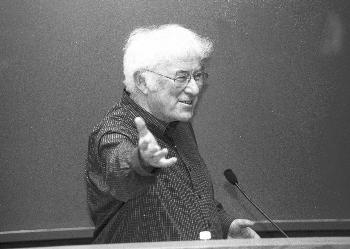
News
Summers Will Not Finish Semester of Teaching as Harvard Investigates Epstein Ties

News
Harvard College Students Report Favoring Divestment from Israel in HUA Survey

News
‘He Should Resign’: Harvard Undergrads Take Hard Line Against Summers Over Epstein Scandal

News
Harvard To Launch New Investigation Into Epstein’s Ties to Summers, Other University Affiliates

News
Harvard Students To Vote on Divestment From Israel in Inaugural HUA Election Survey
Seamus Heaney Speaks On Art of Composition

Nobel Laureate and Emerson Poet-in-Residence Seamus Heaney offered insights on how poetry is composed last night to a standing-room-only Jefferson Hall audience of students, faculty and the public.
The talk, called “Sixth Sense, Seventh Heaven: How Some Poems Got Written,” is the first of three seminars that Heaney will give as part of his visiting lectureship, in which he spends six weeks every other year at Harvard.
He began the lecture by announcing that he would focus on his own process of composition.
“Maybe in question and answer we can talk about other people,” he joked.
Heaney employed the work of philosopher Jacques Maritain to break down composition into three parts.
The first, poetic sense, is an instinct particular to poets, a potential for expression, what Maritain called “an inner melody.”
The second, action and theme, is how poets develop and direct that melody.
The third, expression, is the articulation in poetry of that sense.
To illustrate, Heaney read a few different poets’ thoughts on composition, including William Butler Yeats, William Wordsworth, T.S. Eliot, Wilfred Owen and Elizabeth Bishop.
He even shared with the audience his impression of James Joyce’s “shade.”
“Write for pleasure!” croaked the dead Joyce.
He also read from his own poetry—“Bogland” and excerpts from his poem“Lightenings”—before opening the floor to questions.
Heaney’s last visit to Harvard was in 2000, as a visiting lecturer.
He comes every other year to conduct lectures, readings and discussions with aspiring young poets.
Cindy Fallows, staff assistant to Heaney and part of the Harvard Graduate Design School, coordinated much of the planning for the three seminars that Heaney will be giving here at Harvard.
“The program will hopefully be inspiring to undergraduate poets,” she said.
The next seminar will be a reading from Heaney’s works on Oct. 15 and the final seminar will be a lecture on the translation of poetry on Oct. 22.
Both will take place at 8 p.m. in Emerson Hall 105.
Want to keep up with breaking news? Subscribe to our email newsletter.
